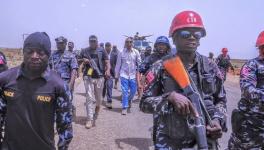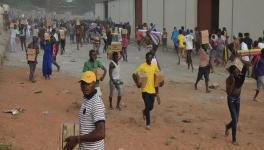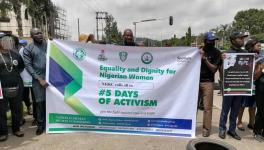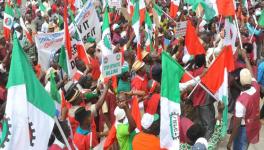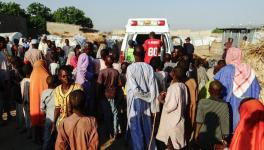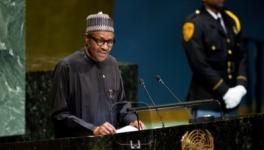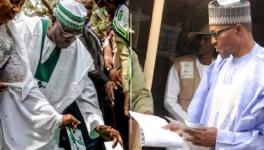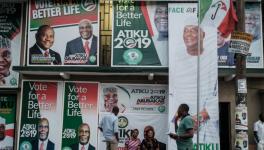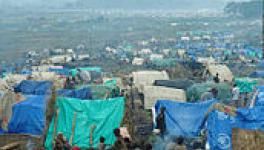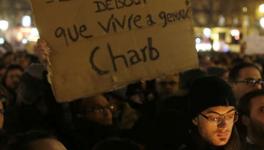Nigeria Polls: Labour Party, Backed by TUs, Emerges as Strong Third Force
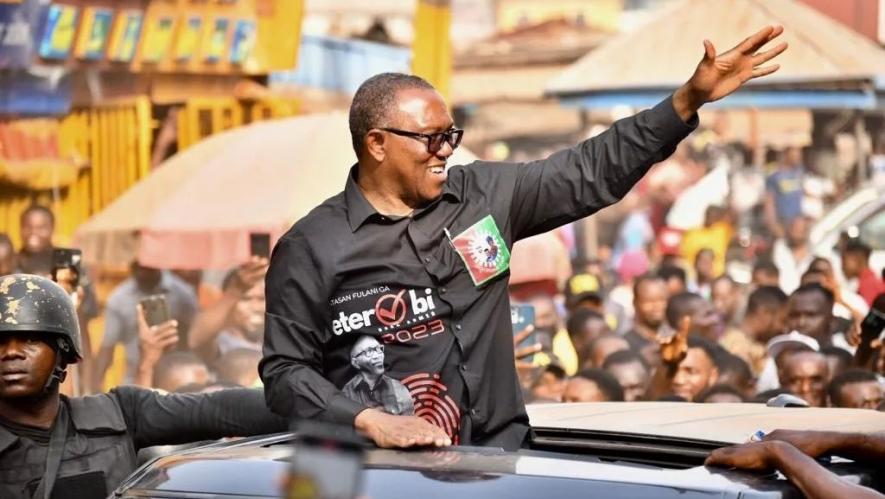
Labour Party candidate Peter Obi during a campaign event on February 15. Photo: Peter Obi/Facebook
With the backing of the country’s trade union movement, Nigeria’s Labor Party (LP) has emerged as a realistic third force ahead of the presidential and parliamentary election on Saturday, February 25, in Africa’s most populous country of over 200 million.
On Thursday, February 23, the Trade Union Congress of Nigeria (TUC) issued a statement appealing to its members in “all the 36 states and the 774 local governments.. to vote for the Labour Party and all their candidates.” Earlier, on Tuesday February 21, the Nigerian Labor Congress (NLC) also declared its support for the LP.
Multiple pre-election polls have placed its presidential candidate Peter Obi in the lead, followed by Bola Tinubu, candidate of the ruling All Progressives Congress (APC), and Atiku Abubakar of the main opposition Peoples Democratic Party (PDP).
The LP, which identifies itself with ‘social democracy’ and opposes the ‘neoliberalism’ upheld by both the mainstream parties, has incorporated within its manifesto several key demands of the country’s labor movement.
60-year old Obi, former governor of Anambra state who left the PDP to join the Labor party last year, is also highly popular among the youth who make up 40% of the 93 million people registered to vote. Many leaders of the youth-led protest movement against police brutality that was met with a fierce crackdown by state, culminating in the Lekki toll Massacre of unarmed protesters by the army in October 2020, have also joined Obi’s campaign.
The incumbent, President Muhammadu Buhari of APC, has completed the constitutional limit of two terms, and will not be contesting the election. His assumption of the high office in 2015, two years after the APC was formed from a merger of four main opposition parties, had marked the first democratic transfer of power since the PDP formed the government at the end of the military rule in 1999. Buhari was re-elected in 2019.
Unemployment quadrupled and consumer prices tripled in Buhari’s two terms
During the eight years of his presidency, unemployment soared from about 7-8% (May 2015) to the current 33%. Among younger adults, the current unemployment rate is as high as 42.5%. Much of this increase came in his first term, well before the COVID-19 pandemic. Consumer Price Index (CPI) has tripled in this period.
“Buhari’s first administration inherited the financial crisis which had begun under the previous PDP administration led by President Goodluck Jonathan,” said Martin Adekunle, general secretary of the TUC- affiliated Nigerian Union of Allied Health Professionals (NUAHP). The price of oil, of which Nigeria is a major producer, had begun to plunge globally starting from 2015. “The sovereign wealth fund was used to cushion the recession, but was mismanaged and squandered,” he said.
Soon after being sworn in as president, Buhari entered into discussions with the World Bank for loans. “He accepted the neoliberal prescriptions of the World Bank and IMF, and went on to slash subsidies, and privatize the energy distribution. Power supply has since become very unsteady,” added Adekunle.
Despite having Africa’s largest reserve of gas and second largest reserve of oil, Nigeria national electric grid distributes only 5,000 megawatts, reportedly sufficient only to cater to about five million urban households on average.
“Most of the businesses are dependent on diesel. A liter of diesel is now above 1,000 Nairas ($2.18, well above the roughly $1.2 in the US). Companies have been moving out of Nigeria in large numbers to countries with a better economic climate,” Adekunle said.
“Workers who had permanent jobs before are now hired on contracts. This has adversely affected the strength of the unions. Companies, especially the MNCs, use intimidation and harassment to stop workers from joining unions. All these factors have combined to weaken the collective power of the working people,” he added.
The PDP, which ruled Nigeria from 1999 till the APC took power in 2015, offers no alternative, argues Adekunle. “The neoliberal policy of privatization and austerity, which began under the PDP administration, was continued by Buhari’s APC administration,” bringing Nigeria to the current crisis, he said.
“But I do see a significant difference in the manifesto adopted by the Labor Party,” he added. “It reflects the needs and aspirations of the country’s working class and its common people. It has a well-defined programme for social-democracy.”
Rooted in the anti-colonial struggles and the subsequent struggles against the military rule, the Labor Party, in its current incarnation, was formed in 2002 under the name Party for Social Democracy (PSD), before renaming itself.
While the party has been winning several local elections, and has had councilors and governors, it had not emerged as an alternative third force at a national level until “a synergy had developed between the trade unions and the Labor Party,” said Yunusa Tanko, LP’s national spokesperson.
“The NLC gave a ten-point charter of demands. The TUC had also placed before the party a document to transform Nigeria from a consumption-driven economy to a production-driven economy. All of this is captured in the electoral manifesto of the Labor Party,” he told Peoples Dispatch.
Key to addressing Nigeria’s economic crisis will be this transformation of its economy into an export-oriented production center, he said, adding, “This will be done by subsidizing production, instead of subsidizing oil consumption.” Results of privatization undertaken by the previous government will be “reviewed,” and a “mix of public-private partnership” will be used to expand and upgrade the country’s infrastructure, said Tanko.
The security crisis
The manifesto also commits to increase the size of the security forces, and sufficiently equip, train, and fund its personnel to enable them to deal with “the incessant banditry, insurgency, kidnaping and cross-border terrorism” wracking the country.
Defeating Boko Haram and reclaiming the areas it had taken over in Nigeria’s northeast was a key promise on which Buhari had won the 2015 election, and the subsequent one in 2019. While most areas have been wrested back from their control, its splinter Islamic State West Africa Province (ISWAP), has carried out a series of attacks in the region and taken control of the region around Lake Chad.
The north and northwestern region is wracked by cattle raiders. Clashes have been reported between herders and farmers in the central regions, and secessionist forces have carried out several attacks in the southeast.
“The Islamist insurgencies in northern Nigeria and other countries in the Sahel have their roots in the US-led war on Libya,” said Adekunle. “Climate change has been another key factor here. The Lake Chad basin is shrinking, causing a shortage of water. Unable to find water and grass for cows, herders are moving south, and clashing with the farmers. Herders and farmers have coexisted in the same regions for centuries without coming into clashes, but that is changing due to climate change.”
Tanko maintains that “International interference for economic control of the Nigerian state is the main issue promoting insecurity in Nigeria,” reiterating LP’s commitment to robust diplomatic efforts and security-sector reforms to double-down the efforts against insurgent groups.
However, security threats to Nigerian citizens have not only from insurgent groups, but also from the security forces themselves. In particular, Nigeria’s Special Anti-Robbery Squad (SARS) has been accused of murders, torture, extortion and several other atrocities. When what came to be known as the EndSars protests, led by youth, broke out in the country in October 2020, the army was deployed alongside the police to crush the protests, which led to the Lekki toll Massacre.
Read | Panel says Nigerian army and police were responsible for death of over 100 EndSARS protesters
Peter Obi was among the few politicians who “condemned the killings of innocent protesters and has promised to restructure the police force, while others are still busy denying that any lives were lost during the protest,” Ayeta Jonathan, who was active the EndSARS protests in Nigeria’s capital Abuja, told Peoples Dispatch. The LP’s manifesto commits to “re-focusing the military on external threats and border protection” and “strengthening.. civilian oversight” of security forces.
Pointing to Obi’s track record during tenure as the governor of Anambra state as a competent administrator who is not mired in corruption scandals, Jonathan said, “he and the LP have ideas and plans of rejuvenating this country and right now the country is in crisis. Obi represents hope.”
While Obi’s supporters point to his frugal lifestyle despite him being a wealthy businessman, critical questions have also been raised about the Labor Party accepting a businessman and a former PDP member as its presidential candidate.
Adekunle, however, is confident that the trade union movement, in which the LP has its roots, is strong enough to “ensure that the party is held accountable to the promises it has made to the working class of the country.”
Get the latest reports & analysis with people's perspective on Protests, movements & deep analytical videos, discussions of the current affairs in your Telegram app. Subscribe to NewsClick's Telegram channel & get Real-Time updates on stories, as they get published on our website.









